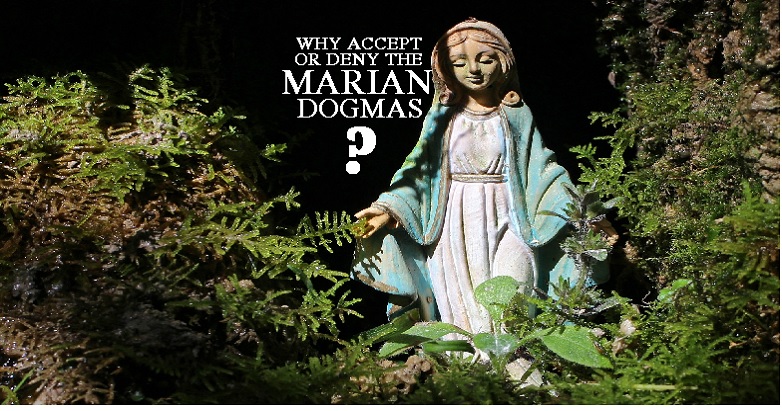
It is less important to affirm or deny the Marian dogmas than why you do so.
When it comes to Mary and Christianity, Billy Joel’s song “I Go to Extremes” always comes to mind. It is difficult to find a balanced approach to our sister and fellow-creature, Mary. At one extreme, Christians think there is nothing special about the Mother of Jesus. On the other, Mary is the center of everything, practically the fourth person of the Trinity.
Want a balanced and “o” orthodox approach to the Blessed Mother? Here is a video presentation on the criteria for proper Marian devotion—
Marian Dogmas & Balance
In medio stat virtus—virtue is in the middle. Our problem is that when it comes to Mary, Catholics forget this truth. We tend to relish going extreme in one direction with the mother of Jesus.
At the opposite extreme are the Mariophobes. Many on the Protestant side of the Tiber are obstinately Marian minimalists. There is nothing special about Mary, a sinner like any other human being, and to some, even more so! And these Christians are brainwashed into anti-Marian rhetoric and vehemently opposed to the slightest suggestion of saying anything positive about Mary.
And many Catholics? They are far to the other extreme, Manchurian candidates about the Virgin. They constantly obsess about her and present her as a goddess in everything but name only. These are the Mariocentrists or Marian maximalists. And, contrary to widespread popular belief among Catholics, it isn’t virtuous to be a Mariocentrist.
Exploring the Marian Dogmas
How do we get to where virtue is? How do we find a balanced approach when it comes to Mary? Well, let’s explore the Marian dogmas and see if we can avoid going to extremes.
By the way, how many Marian dogmas are there? Only two. Some years following the discovery of the function of the mammalian ovum, in 1854, Pope Pius IX solemnly defined the dogma of the Immaculate Conception. After seeing cities vaporized in Japan, In 1950, Pope Pius XII defined the dogma of the Assumption—at the end of her life, Mary was taken bodily to heaven.
Many Catholics will have no problem believing either of these Marian dogmas. But why do they assent to them? That is a more important question.
Orthodox Reasons
If you deny or affirm the Marian dogmas, are your reasons orthodox? It is less important that you affirm or deny the Marian dogmas than why you do so.
For example, St. Thomas Aquinas (d. 1274) denied the Immaculate Conception. He did so for orthodox reasons—Aquinas believed it might detract from the universal redemptive work of Christ. So he was wrong, but for the “right” reasons. And his theological approach was more orthodox than a Mariocentrist fanatic who affirms the Marian dogmas but reasons that “Mary didn’t need a savior.”
Like Bernard of Clairvaux (d. 1153) before him, and his Franciscan friend Bonaventure (d. 1274), Dominican Thomas Aquinas refused to accept this belief. He rejected the Immaculate Conception! It turns out he was wrong for the right reason—St. Thomas thought that believing in the Immaculate Conception necessarily detracted from the universal saving work of Christ.
The later creative thought of Franciscan Duns Scotus (d. 1308) overcame Aquinas’ objections. Scotus showed that properly understood, the Immaculate Conception detracted nothing from Christ’s universal redemptive work. Scotus demonstrated that Mary, the Immaculate Conception, most definitely needed a savior. In fact, he showed that the Immaculate Conception, adequately understood, is the most outstanding application of Jesus’ saving act in history. It means that Mary is the most saved of all creatures.
The Why of Marian Dogmas
So, when it comes to the Marian dogmas, or anything really, it is better to be wrong for right reasons than right for the wrong reasons. But you can’t tell that to the dwindling number of Catholics these days because, for centuries, our overlords have been satisfied with K.I.S.S. (Keep It Simple, Stupid!) catechesis. We prefer verbally orthodox parrots to persons despite what Karl Rahner said: “If you keep repeating dogma, it eventually becomes heresy.”
Well, as the empty pews testify, “Keep It Simple, Stupid!” keeps them stupid, simply. And Dietrich Bonhoeffer (d. 1945) was right—against stupidity, there is no defense.












